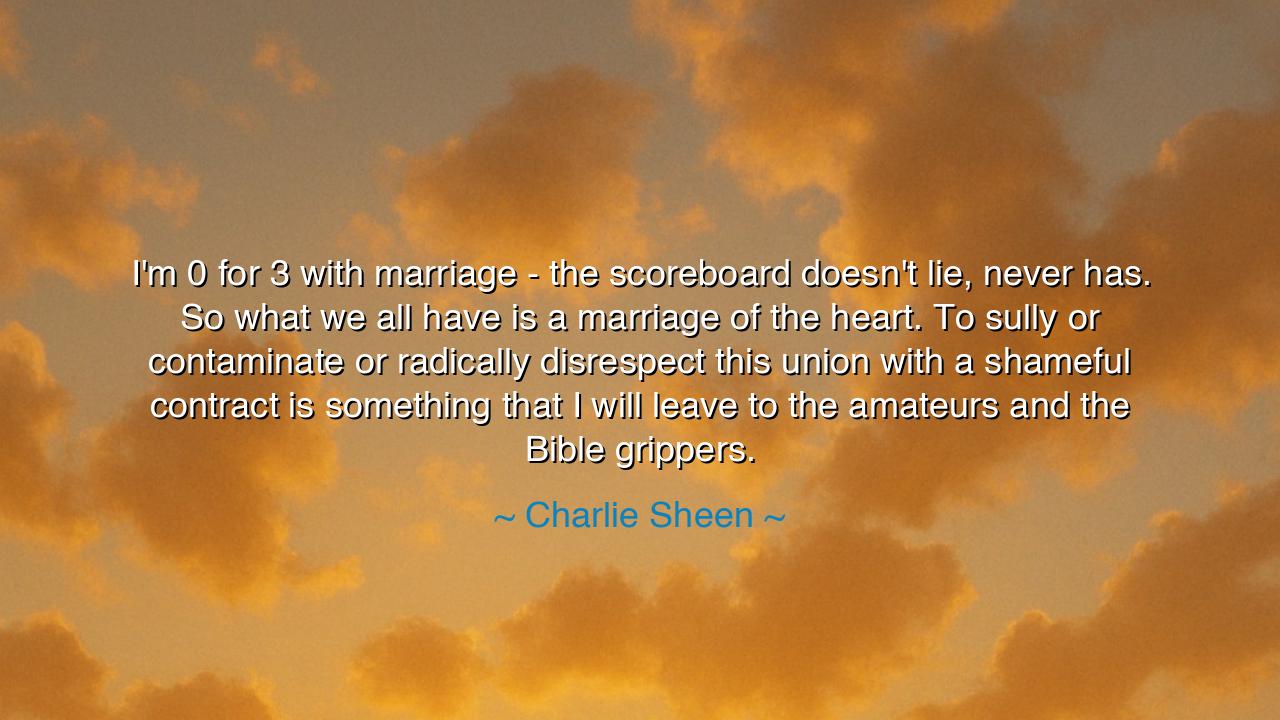
I'm 0 for 3 with marriage - the scoreboard doesn't lie, never
I'm 0 for 3 with marriage - the scoreboard doesn't lie, never has. So what we all have is a marriage of the heart. To sully or contaminate or radically disrespect this union with a shameful contract is something that I will leave to the amateurs and the Bible grippers.






In the words of Charlie Sheen, “I’m 0 for 3 with marriage—the scoreboard doesn’t lie, never has. So what we all have is a marriage of the heart. To sully or contaminate or radically disrespect this union with a shameful contract is something that I will leave to the amateurs and the Bible grippers.” Here we find the voice of a man who has walked through failure, bitterness, and disillusion, and who speaks not in the tones of sanctity, but of rebellion. His words are raw and unpolished, yet they carry the echo of a larger question: what is marriage truly worth, if not lived with sincerity? Is it a sacred covenant, or an earthly contract that binds without love?
Sheen begins with the honesty of defeat: “0 for 3 with marriage.” Like a warrior counting his scars, he admits his battles have ended in loss. The scoreboard—a symbol of truth that cannot be deceived—marks him not as a victor but as one who has fallen again and again. Yet in this confession lies a strange kind of freedom. By acknowledging failure, he dismisses the illusion of perfection. He rejects the weight of appearances and speaks openly of his discontent with the traditional institution of marriage as it has been presented to him.
The ancients too understood the danger of hollow forms. Socrates often warned against rituals performed without meaning, laws upheld without justice, and institutions clung to without wisdom. To him, the essence of virtue was not in custom but in truth. Sheen, though speaking in a voice far more chaotic, echoes this sentiment: that to bind oneself to a contract without love or understanding is to contaminate the very union it claims to sanctify. Better, he suggests, to seek a marriage of the heart—a bond unshackled by law, but rooted in passion and authenticity.
History offers us mirrors of this tension. Consider the marriages of European royalty, arranged for power, land, and alliance. Many of these unions lacked love, and though they satisfied political needs, they often ended in misery or scandal. Catherine of Aragon and Henry VIII were bound by contract and ceremony, yet their union dissolved in bitterness, sparking an entire religious upheaval. In contrast, there are stories of lovers outside the institution of marriage—like Abelard and Héloïse—whose devotion, though forbidden, endured in letters and memory. These tales remind us that a contract cannot create love, and love can endure even without contract.
Sheen’s words, however, carry not only critique but also defiance. He dismisses those who cling to the sanctity of marriage—calling them “Bible grippers”—with the contempt of one who has rejected tradition. In this we see both strength and danger. Strength, because he refuses to be bound by a system that has failed him. Danger, because in scorning all tradition, he risks losing sight of the deeper wisdom that marriage, at its best, embodies: commitment, loyalty, and the building of life together. His rebellion speaks to the eternal struggle between freedom and structure, between desire and duty.
The deeper meaning of his words is this: a union without love is meaningless, but love without responsibility is fragile. A marriage of the heart is noble when it honors sincerity, but dangerous when it excuses selfishness. To dismiss contracts entirely is to risk chaos, but to cling only to contracts is to risk lifelessness. The truth lies in balance: the union of heart and vow, passion and responsibility, freedom and commitment.
The lesson for us is clear: do not reduce marriage to mere appearances, nor let it be defiled by contracts signed without spirit. Seek instead the deeper truth of union, whether bound by law or not. Let love be genuine, let commitment be chosen freely, and let both be honored with integrity. A scoreboard may record failure, but the true measure of a life is not in victories or defeats alone, but in the lessons one draws from them.
Practical actions follow from this wisdom. Examine your unions honestly, ensuring they are rooted in the heart, not in obligation or fear. Do not cling to contracts without love, but also do not mistake rebellion for freedom—for freedom without honor can destroy as much as it liberates. Above all, strive for authenticity, remembering that love is sacred only when lived truthfully.
Thus, Sheen’s words, though framed in defiance, carry an ancient echo: that marriage without destiny is empty, but love without form is fragile. Let us then pass on this truth: that the greatest union is not found in paper or rebellion alone, but in the meeting of two hearts who choose, freely and wholly, to walk together in both passion and purpose.






AAdministratorAdministrator
Welcome, honored guests. Please leave a comment, we will respond soon